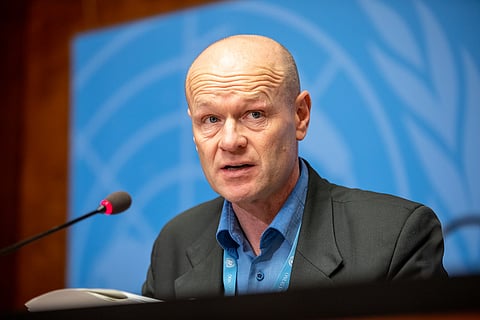
- NEWS
- the EDIT
- COMMENTARY
- BUSINESS
- LIFE
- SHOW
- ACTION
- GLOBAL GOALS
- SNAPS
- DYARYO TIRADA
- MORE

The United Nations said Tuesday the Israeli authorities have denied the UN access to the now-closed Rafah crossing — the key entry point for humanitarian aid into the Gaza Strip.
Jens Laerke, spokesman for the UN's humanitarian agency OCHA, said the inability to get fuel into the besieged Palestinian territory through the crossing risked shutting down aid operations.
The Rafah border crossing with Egypt "is currently under IDF (Israel Defence Forces) control and we have been told there will be no crossings of personnel or goods in or out for the time being", Laerke told a briefing in Geneva.
"We currently do not have any physical presence at the Rafah crossing, as our access to go to that area for coordination purposes has been denied by COGAT," he said, referring to the Israeli agency that oversees supplies into the Palestinian territories.
The Kerem Shalom crossing into Gaza from Israel has been closed since Sunday following rocket attacks.
"The two main arteries for getting aid into Gaza are currently choked off," said Laerke.
He said that with Rafah closed on Tuesday, no fuel would come in as it is "the only entry point for fuel" and without that, operations were "in jeopardy. It does shut it down if fuel does not come in.
"There's a very, very short buffer of about one day of fuel available. Primarily diesel to run trucks and to run generators".
"The one-day buffer is for the entire operation in Gaza."
He added: "If no fuel comes in for a prolonged period of time, it would be a very effective way of putting the humanitarian operation in its grave."
The Israeli army said it took "operational control" of the Palestinian side of the Rafah border crossing overnight.
Israeli military spokesman Nadav Shoshani said that prior to the operation sending tanks into Rafah, the IDF encouraged residents to "temporarily evacuate to the expanded humanitarian area in Al-Mawasi".
There, "the IDF has facilitated the building of field hospitals, tents, and an increase in water, food, and medical supplies", he added.
International organisations were also encouraged to evacuate, "and have done so", he added.
James Elder, spokesman for the UN children's agency UNICEF, said every warning and every story of children being killed and wounded had been ignored.
"Our worst fear — Gazans' nightmare — appears to be a reality," he told the Geneva briefing.
As for the Rafah crossing, "it's hard to see if that closes for an extended period how aid agencies avert famine across the Gaza Strip", he said.
Elder recounted the story of a boy named Mustafa, who had gone out to get some parsley, but was "shot in the head and killed, in the 'safe zone' of Al- Mawasi: the zone where children and families from Rafah are now supposed to flee to".
"Parties to this conflict continue to utterly disregard the lives and protection of children and civilians.
"This is the last chance for this to change. Aid must flow. Hostages must be freed. Rafah must not be invaded. And children must no longer be killed."
Gaza's bloodiest-ever war began following Hamas's unprecedented 7 October attack on Israel that resulted in the deaths of more than 1,170 people, mostly civilians, according to an AFP tally of Israeli official figures.
Vowing to destroy Hamas, Israel has conducted a retaliatory offensive that has killed more than 34,700 people in Gaza, mostly women and children, according to the Hamas-run territory's health ministry.
